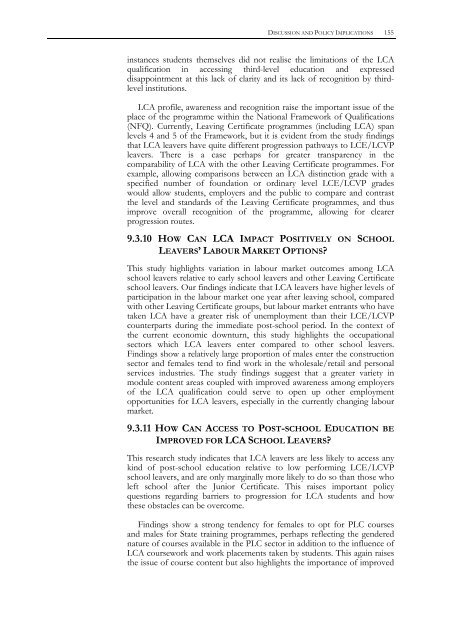Student Experiences of the Leaving Certificate Applied Programme
Student Experiences of the Leaving Certificate Applied Programme
Student Experiences of the Leaving Certificate Applied Programme
You also want an ePaper? Increase the reach of your titles
YUMPU automatically turns print PDFs into web optimized ePapers that Google loves.
DISCUSSION AND POLICY IMPLICATIONS 155instances students <strong>the</strong>mselves did not realise <strong>the</strong> limitations <strong>of</strong> <strong>the</strong> LCAqualification in accessing third-level education and expresseddisappointment at this lack <strong>of</strong> clarity and its lack <strong>of</strong> recognition by thirdlevelinstitutions.LCA pr<strong>of</strong>ile, awareness and recognition raise <strong>the</strong> important issue <strong>of</strong> <strong>the</strong>place <strong>of</strong> <strong>the</strong> programme within <strong>the</strong> National Framework <strong>of</strong> Qualifications(NFQ). Currently, <strong>Leaving</strong> <strong>Certificate</strong> programmes (including LCA) spanlevels 4 and 5 <strong>of</strong> <strong>the</strong> Framework, but it is evident from <strong>the</strong> study findingsthat LCA leavers have quite different progression pathways to LCE/LCVPleavers. There is a case perhaps for greater transparency in <strong>the</strong>comparability <strong>of</strong> LCA with <strong>the</strong> o<strong>the</strong>r <strong>Leaving</strong> <strong>Certificate</strong> programmes. Forexample, allowing comparisons between an LCA distinction grade with aspecified number <strong>of</strong> foundation or ordinary level LCE/LCVP gradeswould allow students, employers and <strong>the</strong> public to compare and contrast<strong>the</strong> level and standards <strong>of</strong> <strong>the</strong> <strong>Leaving</strong> <strong>Certificate</strong> programmes, and thusimprove overall recognition <strong>of</strong> <strong>the</strong> programme, allowing for clearerprogression routes.9.3.10 HOW CAN LCA IMPACT POSITIVELY ON SCHOOLLEAVERS’ LABOUR MARKET OPTIONS?This study highlights variation in labour market outcomes among LCAschool leavers relative to early school leavers and o<strong>the</strong>r <strong>Leaving</strong> <strong>Certificate</strong>school leavers. Our findings indicate that LCA leavers have higher levels <strong>of</strong>participation in <strong>the</strong> labour market one year after leaving school, comparedwith o<strong>the</strong>r <strong>Leaving</strong> <strong>Certificate</strong> groups, but labour market entrants who havetaken LCA have a greater risk <strong>of</strong> unemployment than <strong>the</strong>ir LCE/LCVPcounterparts during <strong>the</strong> immediate post-school period. In <strong>the</strong> context <strong>of</strong><strong>the</strong> current economic downturn, this study highlights <strong>the</strong> occupationalsectors which LCA leavers enter compared to o<strong>the</strong>r school leavers.Findings show a relatively large proportion <strong>of</strong> males enter <strong>the</strong> constructionsector and females tend to find work in <strong>the</strong> wholesale/retail and personalservices industries. The study findings suggest that a greater variety inmodule content areas coupled with improved awareness among employers<strong>of</strong> <strong>the</strong> LCA qualification could serve to open up o<strong>the</strong>r employmentopportunities for LCA leavers, especially in <strong>the</strong> currently changing labourmarket.9.3.11 HOW CAN ACCESS TO POST-SCHOOL EDUCATION BEIMPROVED FOR LCA SCHOOL LEAVERS?This research study indicates that LCA leavers are less likely to access anykind <strong>of</strong> post-school education relative to low performing LCE/LCVPschool leavers, and are only marginally more likely to do so than those wholeft school after <strong>the</strong> Junior <strong>Certificate</strong>. This raises important policyquestions regarding barriers to progression for LCA students and how<strong>the</strong>se obstacles can be overcome.Findings show a strong tendency for females to opt for PLC coursesand males for State training programmes, perhaps reflecting <strong>the</strong> genderednature <strong>of</strong> courses available in <strong>the</strong> PLC sector in addition to <strong>the</strong> influence <strong>of</strong>LCA coursework and work placements taken by students. This again raises<strong>the</strong> issue <strong>of</strong> course content but also highlights <strong>the</strong> importance <strong>of</strong> improved

















